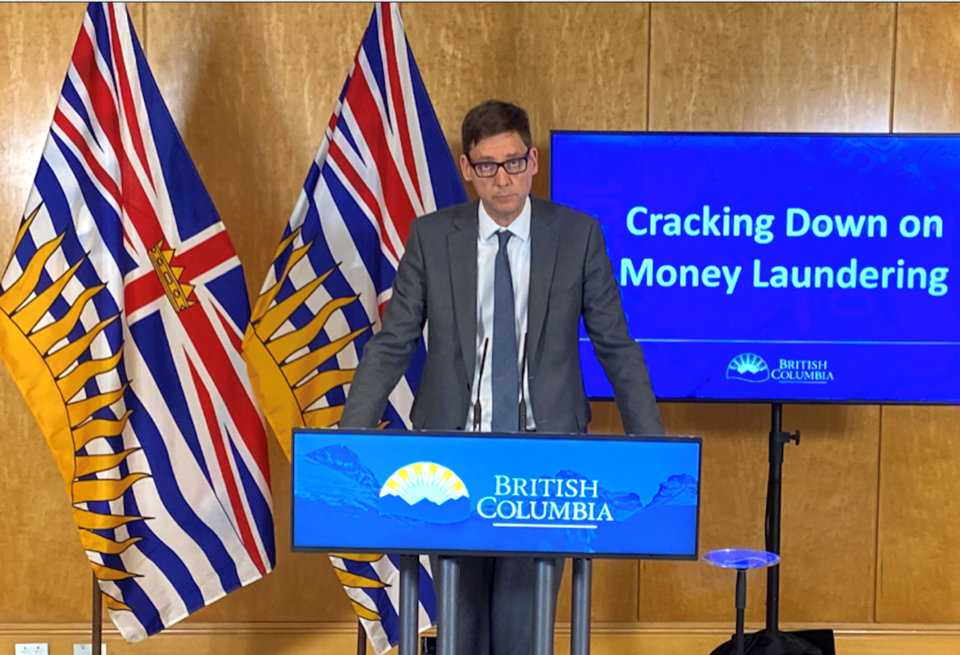B.C.'s public inquiry into money laundering has identified inadequate anti-money laundering policies, regulations and enforcement at the federal level and recommends the provincial government fill the gap.
Wednesday's public release of the final report of the Commission of Inquiry into Money Laundering in B.C. laid bare how the federal government is failing — from a lack of criminal prosecutions to lax oversight of money exchanges and a financial crime analysis centre producing too few intelligence reports for police units.
And if Canada won't step up its anti-money laundering (AML) regime, the provincial government must take the reins, suggests Commissioner Austin Cullen.
The province could do some AML heavy lifting
Among Cullen's recommendations is a provincial AML commissioner who can "monitor the response to money laundering within the RCMP federal police service."
If those services are inadequate, Cullen recommends that B.C. create its own AML police investigation unit.
After noting the Financial Transactions and Reports Analysis Centre of Canada (FINTRAC) produces a "modest" number of intelligence reports for police, he also recommends the province's Policing and Security Branch track disclosures to ensure that they are received "promptly."
And, if FINTRAC doesn't initiate source of funds disclosure requirements for real estate licensees, Cullen suggests the British Columbia Financial Services Authority do so in its place.
It is recommended the province take over the licensing and oversight of money service businesses, which are federal domain but could be regulated provincially, according to Cullen.
It is also recommended the provincial AML unit develop its own software to track trade-based money laundering (TBML), which is considered a growing means of money laundering, according to experts at the inquiry. It involves international trade transactions exploited by criminals and undermines the economy.
Yet, Cullen stated it is unclear whether a federal working group, formed in 2018 to plan against trade-based money laundering, has produced any results or, at this point, even exists.
The Trade Fraud and TBML Centre of Expertise has made no referrals for criminal investigations, and "it remains to be seen whether the centre will continue to receive support from the federal government and whether it will lead to any tangible law enforcement results," stated Cullen.
In contrast, Cullen noted, the United States has had a trade transparency unit since 2004, and approximately 17 to 20 units are currently established worldwide. As of 2015, the unit's network had seized over $1 billion in assets, the report stated.
"I am unaware of any successful trade-based money laundering investigations or prosecutions in recent years," wrote Cullen.
David Eby to examine provincial response
Boiled down, B.C. Attorney General David Eby said he was disappointed and will examine Cullen's recommendations.
"I am disappointed by the commissioner's conclusions about the failures of FINTRAC; the ineffectiveness of federal enforcement responses related to money service businesses; the collapse of the federal working group announced in 2018 related to trade-based money laundering; the adequacy of federal policing dedicated to this issue after a decade of public concern about this," said Eby June 15.
"I agree with the commissioner's implicit conclusion that the province can no longer rely on or wait for federal responses to address this problem. And we must take on a stronger role related to enforcement around previous and exclusively federal responsibilities," said Eby.
Eby acknowledged "constitutional lines" that delegate responsibilities in criminal enforcement.
B.C. will be limited in its response, which will cost money, says expert
Allan Castle, a former RCMP crime analyst and University of B.C. instructor on transnational organized crime, says those lines have blurred somewhat over the past two decades.
Castle said the creation of integrated units in provincial RCMP divisions, such as the 1998 Integrated Proceeds of Crime (IPOC) unit, was a "tacit admission by the feds that they couldn't just exist in a federal bubble to get this done." And so "certainly in the last decades, there has been [integration] between provincial and municipal and federal bodies," he said.
Nevertheless, B.C. will be restrained in what it can do on this file, said Castle.
"B.C. can't just wipe aside FINTRAC, right, and create its own institution," he said.
“What B.C. is doing is, if the province chooses to implement Justice Cullen’s recommendations — which I fail to see how they won’t implement some — what they are doing would be coming to the table with, frankly, more money and more focus on this,” says Castle.
“[They’re] no longer ceding ground to the feds in terms of policy and operational,” he adds, noting that the “brain trust,” including the thinking and strategy, were all inherited from the federal government until recently.
The report, said Castle, "is about saying, you (the feds) have the mandate, but you've somewhat vacated the field, and so we may not have a literal mandate, but we're showing up with money and focus on resources, and we expect you to be at the table. That's what I see as Cullen's recommendations — that the province gets serious because the feds haven't been," explained Castle.
None of the recommendations come with a price tag or roadmap on how they can be effective.
Minister of Public Safety Marco Mendicino was unavailable for an interview on June 17 but issued a statement with the Ministry of Finance to the report.
"The government will conduct a comprehensive review of the AML/ATF Regime, which will be informed in part by the Cullen Commission's final report. Additional legislative proposals will be brought forward to address identified gaps and improve the ability of authorities to detect, deter, investigate, and prosecute financial crimes," stated the ministries, adding more money is being invested in FINTRAC.


